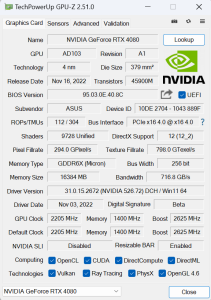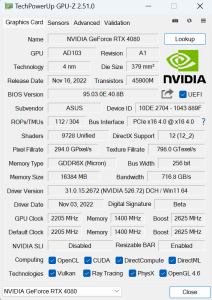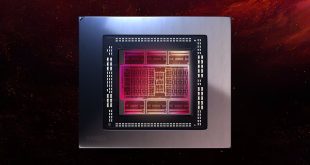
We're almost ready to see what AMD can bring to the market with its RDNA 3-based GPUs, but first we have one more RTX 4080 partner card to assess. This time we're looking at ASUS' flagship, the RTX 4080 ROG Strix. It's a physically huge card that packs a ton of features, including a heavily overclocked core, dual-BIOS, and even a pair PWM fan headers on the card itself. How will it stack up against the competition? We find out today.
The ASUS RTX 4080 ROG Strix is an extreme card in almost every sense of the word. Not only is it absolutely massive, measuring over 35cm long, but it also sports an eye-catching shroud design, with blue and red accents on the front of the card. Factor in the RGB lighting, all-metal shroud and backplate, aggressive overclock and the highest power limit of any RTX 4080 we've tested so far, and there is certainly a lot of promise here.
Let's find out if this card can deliver…
| RTX 4090 | RTX 4080 | RTX 3090 Ti | RTX 3090 | RTX 3080 Ti | RTX 3080 | |
| Process | TSMC N4 | TSMC N4 | Samsung 8N | Samsung 8N | Samsung 8N | Samsung 8N |
| SMs | 128 | 76 | 84 | 82 | 80 | 68 |
| CUDA Cores | 16384 | 9728 | 10752 | 10496 | 10240 | 8704 |
| Tensor Cores | 512 | 304 | 336 | 328 | 320 | 272 |
| RT Cores | 128 | 76 | 84 | 82 | 80 | 68 |
| Texture Units | 512 | 304 | 336 | 328 | 320 | 272 |
| ROPs | 176 | 112 | 112 | 112 | 112 | 96 |
| GPU Boost Clock | 2520 MHz | 2505 MHz | 1860 MHz | 1695 MHz | 1665 MHz | 1710 MHz |
| Memory Data Rate | 21 Gbps | 22.4 Gbps | 21 Gbps | 19.5 Gbps | 19 Gbps | 19 Gbps |
| L2 Cache | 73729 KB | 65536 KB | 6144 KB | 6144 KB | 6144 KB | 5120 KB |
| Total Video Memory | 24GB GDDR6X | 16GB GDDR6X | 24GB GDDR6X | 24GB GDDR6X | 12GB GDDR6X | 10GB GDDR6X |
| Memory Interface | 384-bit | 256-bit | 384-bit | 384-bit | 384-bit | 320-bit |
| Memory Bandwidth | 1008 GB/Sec | 716.8 GB/Sec | 1008 GB/Sec | 936 GB/Sec | 912 GB/Sec | 760 GB/Sec |
| TGP | 450W | 320W | 450W | 350W | 350W | 320W |
Above: Performance BIOS, left, Quiet BIOS, right.
First, for a quick spec recap. RTX 4080 uses the AD103 die, and this is notably smaller than AD102, measuring 378.6mm2. Accordingly, transistor count is reduced from 76.3 billion, down to 45.9 billion. The fundamental building blocks are still the same of course, with the RTX 4080 offering a total of 84 Streaming Multiprocessors (SMs), each housing 256 CUDA Cores, for a total of 9728. We also find 84 RT cores, 336 Tensor cores, 336 Texture Units, and 112 ROPs.
TSMC's N4 node has Nvidia cranking up the clock speed significantly this generation, with the RTX 4080 sporting a 2505MHz rated boost clock. ASUS has increased this further with a 120MHz factory overclock that applies whether you are using the Performance or Quiet BIOS.
The memory configuration is another area where AD103 has been cut-back significantly. The memory interface has been reduced to 256-bit, and even with 16GB GDDR6X running at 22.4Gbps, that cuts memory bandwidth down to 716.6GB/s. That said, there has been a substantial upgrade to the L2 cache with the Ada architecture, with the RTX 4080 now offering 65.5MB, compared to just 6MB for GA102.
Considering RTX 4080 is notably cut-down versus the RTX 4090, rated power draw is lower, with a 320W TGP. ASUS has increased this to 360W for the Performance BIOS but the Silent BIOS keeps the 320W limit.
 KitGuru KitGuru.net – Tech News | Hardware News | Hardware Reviews | IOS | Mobile | Gaming | Graphics Cards
KitGuru KitGuru.net – Tech News | Hardware News | Hardware Reviews | IOS | Mobile | Gaming | Graphics Cards





